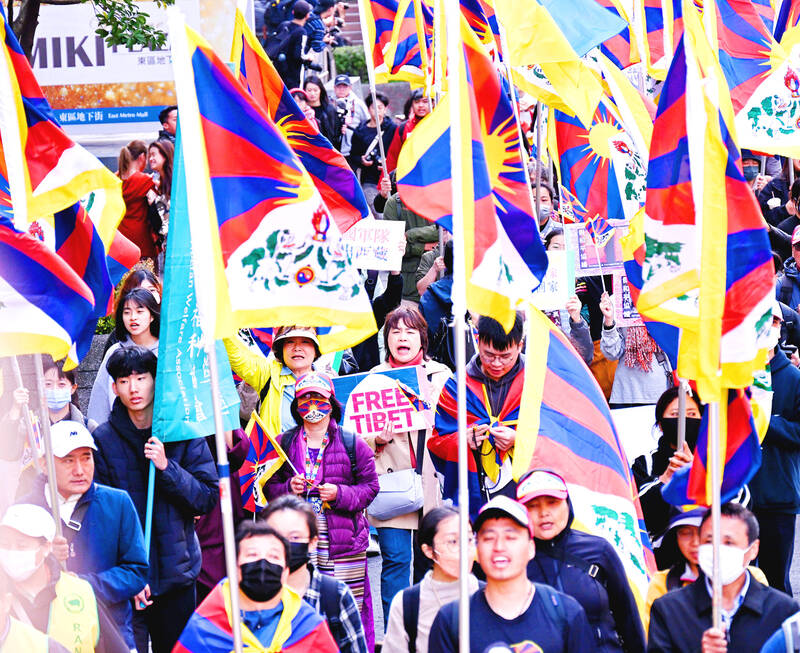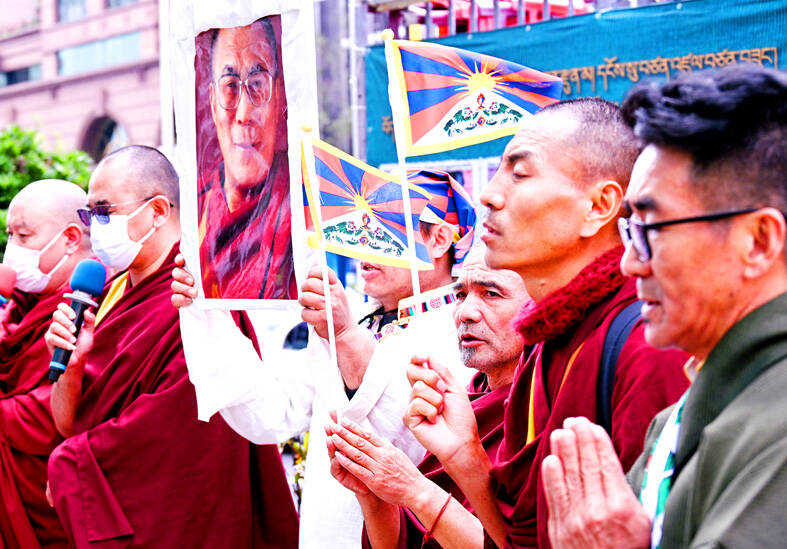Hundreds of people yesterday marched in Taipei to commemorate the 66th anniversary of the Tibetan uprising, protesting the Chinese Communist Party’s (CCP) cultural and ethnic genocide in Tibet.
When the protesters arrived at Sun Yat-sen Memorial Hall, they held a ritual to commemorate people killed in the uprising. At the Taipei branch of Bank of China in Xinyi District (信義), they demonstrated against the disappearance of the Panchen Lama and the destruction of Tibetan Buddhist culture.
Kelsang Gyaltsen Bawa, representative to Taiwan of the Tibetan government-in-exile, said the theme of this year’s march was “Tibet has never been part of China.”

Photo: Fang Pin-chao, Taipei Times
Tibetan Uprising Day on March 10 honors those who participated in the Tibetan uprising against CCP rule 66 years ago, while calling for freedom and human rights in Tibet, he said.
In 1951, the CCP used force to compel Tibet to sign the Seventeen-Point Agreement, or the “Agreement on Measures for the Peaceful Liberation of Tibet,” but then occupied Tibet, resulting in the deaths of more than 1.2 million Tibetans, he said.
China’s repressions in Tibet continues, with at least 157 Tibetans self-immolating in protest, he added.

Photo: Fang Pin-chao, Taipei Times
Kelsang Gyaltsen Bawa said the so-called “peace agreement” was malicious, and in the year it was signed, Chinese troops occupied Tibet, tearing up the agreement that promised Tibetans the right to self-government.
On March 10, 1959, the CCP ordered the suppression of a protest against China in Lhasa, which led to the Dalai Lama and many other Tibetans fleeing to India, he said, adding that Beijing continues to carry out cultural, religious and ethnic genocide in Tibet.
The UN last year reported on China’s long-term human rights abuses in Tibet, as well as its threats against Tibetans living abroad, Kelsang Gyaltsen Bawa said.
He said he was hopeful the march would make more Taiwanese aware of the situation in Tibet.
The march was not just to commemorate the uprising, but to express the hope that Tibetans would one day be able to return to their homeland, he said, adding that the Dalai Lama is to turn 90 this year.
Human Rights Network for Tibet and Taiwan secretary-general Tashi Tsering said the CCP has intensified the oppression of Tibetans since Chinese President Xi Jinping (習近平) took office, while also cracking down on democracy movements in Hong Kong and constantly threatening Taiwan.
Tibetans hope the Chinese military would leave Tibet, he said.
“Tibet belongs to the Tibetans, just as Taiwan belongs to Taiwanese,” he added.
National Human Rights Commission Vice Chairwoman Wang Yu-ling (王幼玲) and Control Yuan members Kao Yung-cheng (高涌誠), Yeh Ta-hua (葉大華) and Chi Hui-jung (紀惠容) also attended the march, the first time that the commission has participated in the annual event.
Wang said the issues in Tibet are human rights matters, as the CCP invaded and occupied Tibet under the pretense of a peace agreement, and it is continuing to destroy Tibetan culture and religion.
“Human rights have no borders, as it is a universal value, and today’s Tibet could be the future of Taiwan,” she said, adding that the commission is honored to stand beside friends who care and support Tibetans, hoping the issues in Tibet can be understood by more people.

US President Donald Trump yesterday announced sweeping "reciprocal tariffs" on US trading partners, including a 32 percent tax on goods from Taiwan that is set to take effect on Wednesday. At a Rose Garden event, Trump declared a 10 percent baseline tax on imports from all countries, with the White House saying it would take effect on Saturday. Countries with larger trade surpluses with the US would face higher duties beginning on Wednesday, including Taiwan (32 percent), China (34 percent), Japan (24 percent), South Korea (25 percent), Vietnam (46 percent) and Thailand (36 percent). Canada and Mexico, the two largest US trading

ACTION PLAN: Taiwan would expand procurement from the US and encourage more companies to invest in the US to deepen bilateral cooperation, Lai said The government would not impose reciprocal tariffs in retaliation against US levies, President William Lai (賴清德) said yesterday, as he announced five strategies to address the issue, including pledging to increase Taiwanese companies’ investments in the US. Lai has in the past few days met with administrative and national security officials, as well as representatives from various industries, to explore countermeasures after US President Donald Trump on Wednesday last week announced a 32 percent duty on Taiwanese imports. In a video released yesterday evening, Lai said that Taiwan would not retaliate against the US with higher tariffs and Taiwanese companies’ commitments to

‘SPECIAL CHANNEL’: Taipei’s most important tasks are to stabilize industries affected by Trump’s trade tariffs and keep negotiations with Washington open, a source said National Security Council Secretary-General Joseph Wu (吳釗燮) arrived in the US for talks with US President Donald Trump’s administration, a source familiar with the matter said on Friday. Wu was leading a delegation for a meeting known as the “special channel,” the Financial Times reported earlier. It marked Trump’s first use of the channel since returning to the White House on Jan. 20. Citing a source familiar with the matter, the Financial Times reported that Minister of Foreign Affairs Lin Chia-lung (林佳龍) was also a part of the delegation. The visit came days after China concluded war games around Taiwan and amid Trump’s

CHIP EXCEPTION: An official said that an exception for Taiwanese semiconductors would have a limited effect, as most are packaged in third nations before being sold The Executive Yuan yesterday decried US President Donald Trump’s 32 percent tariff on Taiwanese goods announced hours earlier as “unfair,” saying it would lodge a representation with Washington. The Cabinet in a statement described the pledged US tariffs, expected to take effect on Wednesday next week, as “deeply unreasonable” and “highly regrettable.” Cabinet spokeswoman Michelle Lee (李慧芝) said that the government would “lodge a solemn representation” with the US Trade Representative and continue negotiating with Washington to “ensure the interests of our nation and industries.” Trump at a news conference in Washington on Wednesday announced a 10 percent baseline tariff on most goods